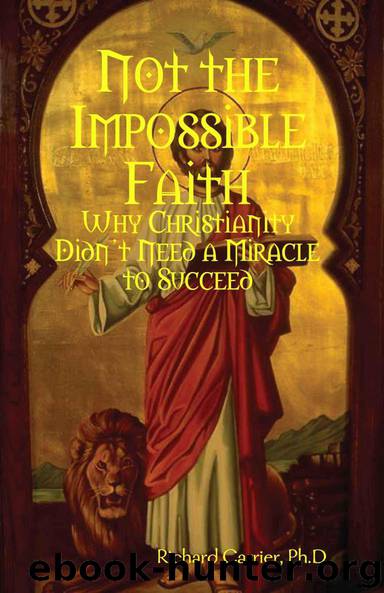Not the Impossible Faith by Richard Carrier

Author:Richard Carrier [Carrier, Richard]
Language: eng
Format: mobi
Published: 2009-02-10T05:00:00+00:00
And though “they were not concerned at all to reform society,” they were concerned to maintain a satisfactory society ‘within’ society, which strove to be accepted by outsiders, while realizing ideal social values within the in-group, which would prefigure the perfect society of the cosmic future. “Compelling evidence” never comes up in Malina’s explanation here, much less evidence of the supernatural, and even less that of the resurrection. Only for later Christian missionary work does he reference the role of healings, exorcisms, and revelations as elements employed to win converts, and these I’ve addressed already in Chapters 6 and 7, and shall address further in Chapter 13.
And this is how Bruce Malina himself accounts for that success. He has never appealed to Jesus actually being God. He has never said the evidence of Christ’s divinity or resurrection had to be compelling, or anything like that. To the contrary, Malina has consistently argued in numerous books that Christianity’s success was due to the rhetorical skills of its missionaries, who properly contextualized the faith in terms both acceptable and attractive to their collectivist culture. Again, the only reference he ever makes to the evidence Christians appealed to, besides missionary healing and exorcism, was the role of divine revelation—in other words, appeals to religious experience—which he connects to the Jewish prophetic tradition.307 Never do the miracles of Christ’s ministry or resurrection play any role in Malina’s theory of Christianity’s success. All he argues as necessary were a properly constructed (and properly presented) theology, and appeals to private communications from God affirming that system (which we, today, can neither verify nor falsify as such).
Malina doesn’t even appeal to miracles performed by Christian missionaries as important to their success (again apart from healing and exorcism) since he generally treats miracle reports (especially in the Gospels) as symbolic rather than historical. Some miracle narratives were indeed purely or largely symbolic. But the Christian mission did require some genuine displays of “supernatural” power to prove its divine backing. Holding is right about that, since the appearance of “divine backing” was essential to the Christian solution to popular social problems. However, when we look at what miracles were actually used by the Church (as seen in Paul and Acts), none required any real supernatural power at all—only the perception of it (as discussed in Chapter 6, and I’ll explore the same point again in Chapter 13). In fact, Malina argues, Christianity was no different in this regard than any other shamanic tradition throughout human history.
Moreover, contrary to Holding’s reasoning, merely performing supernatural feats (even the resurrection of Jesus himself) would be incapable of winning converts anyway. In a groupthink culture, those feats had to be acknowledged by the group as divine—rather than, for example, demonic, or the product of trickery. If the group appealed to was already hostile to the Christian message, it would not define any miracle, even a genuine one from God himself, as divine, but as demonic or fake. That’s how groupthink works. As shown
Download
This site does not store any files on its server. We only index and link to content provided by other sites. Please contact the content providers to delete copyright contents if any and email us, we'll remove relevant links or contents immediately.
The Daily Stoic by Holiday Ryan & Hanselman Stephen(3304)
The Fate of Rome: Climate, Disease, and the End of an Empire (The Princeton History of the Ancient World) by Kyle Harper(3056)
People of the Earth: An Introduction to World Prehistory by Dr. Brian Fagan & Nadia Durrani(2733)
Ancient Worlds by Michael Scott(2682)
Babylon's Ark by Lawrence Anthony(2673)
The Daily Stoic by Ryan Holiday & Stephen Hanselman(2572)
Foreign Devils on the Silk Road: The Search for the Lost Treasures of Central Asia by Peter Hopkirk(2463)
India's Ancient Past by R.S. Sharma(2451)
MOSES THE EGYPTIAN by Jan Assmann(2412)
The Complete Dead Sea Scrolls in English (7th Edition) (Penguin Classics) by Geza Vermes(2277)
The Earth Chronicles Handbook by Zecharia Sitchin(2227)
Lost Technologies of Ancient Egypt by Christopher Dunn(2223)
24 Hours in Ancient Rome by Philip Matyszak(2078)
Alexander the Great by Philip Freeman(2064)
Aztec by Gary Jennings(2023)
The Nine Waves of Creation by Carl Johan Calleman(1915)
Curse Tablets and Binding Spells from the Ancient World by Gager John G.;(1860)
Before Atlantis by Frank Joseph(1849)
Earthmare: The Lost Book of Wars by Cergat(1824)
